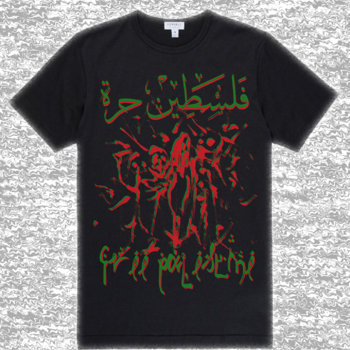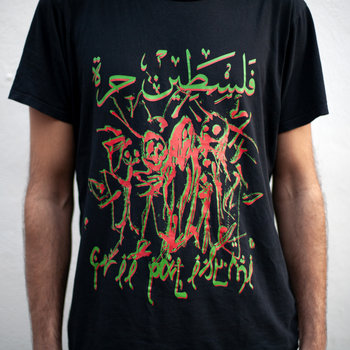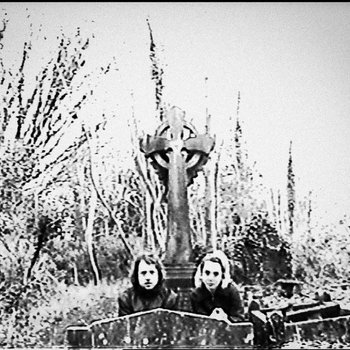
Bristol-born artist Laura Phillips is discussing the specific nuances behind the embrace of “folk culture” by her hometown’s underground art scene. “There’s a romanticism about folk art that stems from an 18th century pastoral vision of, like, a woman picking ferns—very ‘chocolate box [artwork],'” she says. “That twee-ness is a bit of a fallacy.” As Phillips says, folk is a loaded term, one that conjures up images of acoustic instruments being played in quaint countryside landscapes. In reality, a genre like grime would be a more accurate reflection of folk music. Think of the early grime tune “One Day I Went To Lidl” by Afrikan Boy. It pokes fun at shoplifting from a Lidl in South East London with deadpan humor, and it was never meant to be a commercial hit. “Grime is more folk than Mumford & Sons,” agrees Phillips. “Mumford & Sons can fucking do one!”
“Experimental” has been a catch-all term in Bristol, a word used to describe the grey area between the deconstructed club of labels like Timedance and Livity Sound and artists who steer clear of club music altogether. But as of the early 2010s, there’s been a gradual rise in the amount of esoteric poetry, haunted verse, ritualistic drone, and chamber music improv—to the extent that the term “experimental” fails to get across the shared aesthetic that currently pervades the West Country. The term “folk art” has a reclusive quality about it, however, which is informed by the everyday lives and identity of a certain people (“volk” meaning “people” in German). As a result, the term “avant folk” seems a fitting way to describe Bristol’s autonomous approach, as well as its sound, which blurs the line between myth and reality.
This is largely down to an experimental approach to art from the city’s many collectives. Phillips, for example, used to be part of BEEF (Bristol Expanded and Experimental Film) which was not only founded for those interested in shooting on 16mm film to collaborate and share resources, but to make a stand against “any defined notions of medium specificity,” embracing a crossover between experimental music and experimental film. They believe that artists are simply artists and shouldn’t fall into the categories of musician or filmmaker or actor.


This open-minded approach has been a part of the city’s culture since the ‘80s, when the Wild Bunch brought New York’s hip-hop culture—with its overlap in graffiti and music—to the shores of Bristol. Since then, Young Echo have arguably been the city’s most influential collective, defining what it means to be experimental. The earliest members of the group (Amos Childs, Joe McGann, Sam Kidel, Sam Barrett and Seb Gainsborough) made and shared music that ranged from blues to IDM to dubstep to techno with its roots firmly in keeping with DIY soundsystem culture—much like the Wild Bunch. The main difference between Young Echo and the Wild Bunch, though, is that the parameters of what’s considered new and exciting are a lot wider and more experimental now than they were back then. Young Echo pair extremes in club and non-club music to the point that it’s not just a mix of genre and styles—genre and style are nowhere to be seen. In a few years, they grew a cult following, and the collective went from being a handful of guys broadcasting radio shows from their bedrooms to a monthly party at The Exchange where nearly every night welcomed someone new into the fold—misfits who enjoyed making music free of expectations.
Courtney Beckford is a case in point. As Hi5ghost, he was part of the beloved grime and dubstep collective Bandulu, but became disillusioned with playing to a bunch of ravers who were only waiting for the next drop, and saw Young Echo’s nights as a place where the full breadth of someone’s music would be appreciated. For his first gig at the Exchange, he performed under the name Wu-Yen and played a set of (literally) broken records accompanied by homemade visuals. He now considers himself a sound artist (rather than a DJ and producer) and goes by the name Yuseemi, collaborating with visual artists and actors. He reflects fondly on that set at Young Echo and, although he doesn’t produce under that alias anymore, his music as Wu-Yen appears on a compilation alongside other Young Echo members over on No Corner, a label run by fellow crew member, Dan Davies.


Between 2013 and 2016 No Corner was the unofficial label of Young Echo, a place where Davies encouraged the group to release music they perhaps weren’t sure about, but which he believed in. The imprint’s debut record, for example, was a recording of Joe McGann (known for his heady dubstep as Kahn) singing over a sparse Jabu dub beat, from one of Young Echo’s early radio shows. In this way, No Corner enforced Young Echo’s DIY and countercultural ethos.
But Dan was keen to take it further. “A fuckpunk is a punk who doesn’t give a shit about anything,” says Davies describing the inspiration for the name of his spinoff imprint FuckPunk, which he shares with Seb Gainsborough, aka Vessel. “They’re not even anarchist or political—they’re like fuck everything. Submit to the apocalypse and take the piss.” To understand what he means, watch this music video that follows a day in the life of a typical fuckpunk. The video’s most bizarre moment comes when our protagonist waves through a window at someone wearing a ball gag in their mouth, doing their ironing with one hand on the iron and the other hand down their trousers. Fifty Shades of Grey this is not. This is Max Kelan who directed both FuckPunk videos (under his production moniker, Max Kelan Pearce) and who is notorious for performing in BDSM gear as one half of Bad Tracking.
More than just adding shock value, Davies’s and Kelan’s anarchic streaks were catalysts for other artists to push things to the extreme. Kelan’s nude show at a local venue, for example, led to an MP tweeting about it and the venue banning him from playing there again, to which two of Kelan’s friends—Hamish Trevis and Miles Opland—responded by putting up posters around town calling for an end to this policy that prohibits people from performing in the nude. “Abolish the Pheasantry Act of 1784” read the posters, which has since become the slogan for Trevis’ label Ceramics and inspired the Pheasantry Society, a safe space to gather and toy with fantasy.


Cassette

Trevis (aka Kinlaw) doesn’t claim to know much about medieval history but views the Pheasantry Society as simply an opportunity, like Davies and FuckPunk, to have fun and see how far he can push something. In 2022, he organized the society’s first moot at the Cube Microplex Cinema, where people were invited to come, dressed in Middle Ages garb and take part in an evening of role play, workshops, and chamber music. “It reminded me a bit of the Dorset knob throwing festival,” laughs Trevis. “A sort of bizarre meetup where everyone’s dressed up for it.”
He was pleasantly surprised by the turnout and, since that inaugural run, other similarly folkloric events have been popping up around town: We Intend To Cultivate Havoc (W.I.T.C.H) ran an evening of experimental soundscapes, obscure performances and interactive installations exploring folklore at The Mount Without church; Doozy Magazine launched their latest issue with a night centered around the theme of “lore”; and QWAK club hosted Avant Folk Ensemble at the Cube Microplex in November 2023 as well as the folk-y free jazz group Gentle Stranger earlier this year.
“For me, it’s the influx of fine art students that feels new,” explains Trevis, trying to pinpoint what might have spurred this spike in folk themes throughout Bristol’s underground. He welcomes it, saying that it’s maybe a sign things are more fluid between the art scene and the music scene than he was aware of them being before, back when he was a photography student finding his feet in the city. “That was what was so nice about the Brunswick Club. It was two fine art collectives who bridged that gap between the people who studied in visual art and those doing music. Now the music scene feels like it’s quite significantly driven by people from the art scene.”
The Brunswick Club was an old working men’s club, complete with a skittle alley and a trophy cabinet, which housed the city’s art students and local polymaths between 2017 and 2019. Experimental film collective BEEF shared space with art collective CHAMP and theatre group Residence, while members of music collectives like Avon Terror Corps (ATC) and Young Echo threw album launch parties and recorded music videos in its basement. Skye Turner was at the heart of this. She studied Fine Art at The University of the West of England (UWE) and met members of BEEF and CHAMP by going to The Brunswick Club. She now works as a visual artist and fabricator; has recorded dark ambient for Avon Terror Corps as Lycanthropocene; directed a video called Larpe Diem (which premiered at Trevis’ moot) and performed as a giant salmon for ATC’s Takeover at Strange Brew—to name just a fraction of her portfolio.








T-Shirt/Apparel, T-Shirt/Shirt




“Role play is really important to my practice,” she says. “I develop characters over long periods of time, write as them, try to read my environment through their lens and produce artifacts and costumes to suit their aims.” Like Trevis, Turner opened her practice up to others with a series of workshops in 2023 titled LARPgarden. These were hosted by friends Cassie Ireland, Lottie Brown, and BIPED, and they explored how role play could be used in other mediums. In BIPED’s, for example, participants played at being bards by going out into Bristol and playing improvised music and sounds in a non-verbal attempt at projecting myth and fiction onto their surroundings. This feels particularly poignant now that so few spaces of Bristol’s underground lore still exist. The Brunswick Club was bought by property developers, Idle Hands no longer has a physical shop, and the many squats and guardians that used to populate the city and host illegal raves have all but been developed into office blocks and apartments that are less communal than their predecessors.
To outlast this apocalypse, Bristol’s artists need to be as versatile and as striking as the Trinity Centres of their city. “If you’re a small artist of experimental music and you approach a big festival, most of the time they will not notice you,” explains French-born artist Dali de Saint Paul who founded the artist-led cooperative Music To Come alongside Max Kelan, Franco Franco, and Al Cameron. “If we are a group of artists working together trying to offer them something special just for their festival, maybe they’ll [notice us]. We each have something unique to offer [as individuals] but together we will be more powerful.”
Music To Come’s roster includes Young Echo’s Jabu, Max Kelan (Kelan), Hamish Trevis (Kinlaw), Dan Davies (Ossia), and multimedia artists like Skye Turner, via Avon Terror Corps. At first glance, it’s hard to spot a common theme among these names—other than the fact that they’re all based in Bristol. But Cameron and Dali are keen for it not to be an exclusively Bristol thing. When the idea of “folk” is suggested, they warm to it. “There’s an idea of socialism in British folk which ties to Music To Come’s idea of cooperation and collectivity,” agrees Cameron. “We’re trying to bring something from that folk-y, collective approach where we can support [the artists’] careers by funding their ideas, helping them to book shows in Europe and working with festivals so they pay a decent fee to the artists. We want to create more opportunities for all the people involved but not compromise on that thing of collectivity and, I suppose, people.”
So where does that leave the idea of folk art that Phillips was so hesitant to commit to? From Young Echo to Music To Come, these artists and institutions have resisted the post-underground hegemony by embracing values that are inherent to folk culture. The music is experimental, yes; but in Bristol, the end product of that experimentation has been unique to the area and, more importantly, its people. The music is so primal, so insular and so full of both traditional folk themes and avant-garde experimentation that it’s hard to deny the shared aesthetic between them all which, as Phillips puts it, “has got that Somerset, Wessex separatist vibes, but at the same time is so much embedded in soundsystem culture.” The music is not twee or “chocolate box,” it’s rugged and real and reflective of the people living in an urban landscape that’s constantly changing.
Dive into the list below to hear what that sounds like.
Belan
Untitled


Vinyl LP


Living with five people she didn’t know (and a screaming baby), writer and musician Catrina Davies fled her cramped house share in Bristol and went to live in her dad’s derelict office shed, set back from a crossroads somewhere in Cornwall. In a few years, she had turned that crumbling shack into a home and wrote about it in her book Homesick, which acts as a memoir, a critique on the housing crisis in the UK, as well as a complementary lyric book to this cassette. She shares it with her partner and renowned selector around Bristol, Andy Mac, whose dub influence turns Davies’s singing into something fit for a 1940s radio set—wibbly, wobbly, and wonderfully earthy.
Salac
Illicit Rituals




Cassette


Max Kelan and Clíona Ní Laoi lean into the gothic folk of their Celtic and Gaelic roots as Salac. Both “Pythonness” and “Join Us/The Snake” begin with rasping vocals and spectral ambience and end on something more abrasive—be it Kelan’s pounding beats on a dated drum machine or his commanding verse. That harder side to Salac would later get its own space on Kelan’s standalone poetry tape and his debut solo album. But the juxtaposition of it here with Clíona Ní Laoi’s acoustic instruments and doomscapes capture the primal meets punk clash typical of this sect in Bristol’s underground music scene.
Birthmark
Lamentations



Vinyl LP

Birthmark’s devotion to Bristol’s folk culture is unparalleled. Before he moved to the Avon capital, he would travel religiously to every Young Echo event to the point where the group approached him one evening and commented on it. He is now a member of the collective and, though there are similarities between his work and the sound collage of Young Echo’s O$VMV$M, his productions have a stark neorealism about them that stands out. The sweeping minor key strings on “Origami” are feudal, while Birthmark’s pitched-down vocals mar ritual with reality.
Viridian Ensemble
Trotula





Cassette



Viridian Ensemble was dreamt up over a pint at the St George’s pub where Laura Phillips, Liz Muir, and Caitlin Callahan were discussing a sexist comment someone had made towards Callahan: the person presumed that Callahan must be the singer of the band she was performing with—even though she was holding a double bass. This encouraged Muir, Callahan and Phillips to set up an all female/femme ensemble where every performance would be an improvised call and response between the musicians, Phillips on visuals and Dali on vocals, and in doing so would defy all expectations and stereotypes. Since a big part of their live performance is improvisation, they never intended to record anything. Trotula is Viridian Ensemble’s only recorded artifact as of yet. It takes its name from an elusive set of medicinal texts written in the Middle Ages. Trotula was the last show to be played at The Brunswick Club and you can picture the scene: dark basement room, low ceilings, carpeted floor, and a heaving mass of people at the mercy of Dali’s looped and morphing incantation “Cephalopodddd… Cephalopodddd…Cephalopoddd.”
Drips of Fosterham
Drips of Fosterham





Cassette




A tape of comedy sketches and lo-fi beats, Drips of Fosterham, is a lockdown project between Skye Turner and Sam Pilbeam that strikes an uncanny chord, employing MF DOOM samples, British daytime television, and Ivor Cutler. It’s a good insight into the role play of Turner’s artistry, as she and friends take on a range of characters from the self-absorbed “Boglemeister” (who sounds like Will Ferrell from Eastbound and Down), to the dark arts TV show host “Mr Magic,” to someone’s grotesque description of turning into a sort of living Notre Dame on “Creme Goil.” It’s both funny and disturbing—kind of like Salad Fingers.
Goblin Gathering
S/T






“The idea is that you’re listening to a role-play game,” says Trevis of his mixtape Goblin Gathering. “I got loads of people to send me voice recordings of them making up a spell, or pretending to be a goblin. Larry [aka Bruce] sent me loads of recordings of him being a lord, for example.” Trevis and friend Miles Opland then hosted a chatroom party where everyone who had sent them voice recordings performed in character, as Trevis and Opland narrated a fantastical script. One of the tape’s many rewarding left turns is hearing how well TNT Roots’s steppers fits in with the haunting industrial before it. It’s an epic, anachronistic mix that’ll make you wish you’d not traded in your PS2 at CEX.
O. G. Jigg
Dominion Window




Cassette


Similar to Goblin Gathering, O. G. Jigg (aka Will Memotone) makes a caricature out of mediaeval music’s grandeur and melancholy by giving it an RPG feel. Horn synths leap triumphantly on “Treasure Chest,” like you’ve just unearthed The Boss Key from a temple in The Legend of Zelda, while sprightly organ keys open “The Ice House” before getting sucked into its lingering drone. It’s both delightfully simple and immersive.
Various Artists
ALWAYS + FOREVER



Vinyl LP

In 2020, Jabu’s trio of Amos Childs, Alex Rendall, and Jasmine Butt spawned a parallel label and collective to Young Echo called Do You Have Peace?, which has become a base for their sonic iterations. For the label’s debut cassette and LP, for example, they brought in writer, DJ, and poet Daniela Dyson who added colorful touches of magical realism to the group’s newfound dream pop sound. The group expanded again last year to form Birds of Peace Orchestra, which still includes Daniela Dyson as well as Jeremy Wiles (Intel Mercenary) and a rotating cast of guest appearances which you can hear on the debut record ALWAYS + FOREVER. Childs prefers to compare Birds of Peace’s improvised nature to free jazz rather than folk but there are similarities there. The raw vocals and rugged acoustics of “Sweet Paradise” as well as the dubby sheen and drone of “Freeze in the Aisle” bring to mind NoCorner’s Belan. And there’s a hint of Dead Space Chamber Music in Vessel & Rakhi Singh’s unsettling strings on “It Can’t Be Helped (There Is Nothing In The Sky).”
Sarahsson
The Horgenaith






Compact Disc (CD), T-Shirt/Shirt,




“You have these paintings, like Ophelia, where women are lying limp in nature just looking beautiful. They’re these objects of nature which are studied, picked, and plucked at,” Sarahsson says. Her debut record The Horgenaith is an antidote to both this passive stereotype as well as to the tweeness of folk art. The album is about discovering femininity from the perspective of a trans femme connecting with the changes in her body. As a result, the record has sharp contrasts: “Tonsil Pearls” zigzags through tempos; “Lacing The Well” and “I Am The Earth” flow from twinkling plucks to electric guitar drone; and her homemade instrument—the daxophone—just about hangs on through erratic shocks of sub bass and Buoys Buoys Buoys’s demonic verse on “Swallow.” Twee this is not.
Kinlaw & Franco Franco
Crocs on the Plough




7" Vinyl


Never have you heard “potato” said so frequently in a song before. Franco Franco is another vocalist like Dali de Saint Paul, Birthmark, and Daniela Dyson who have been a breath of fresh air in Bristol’s underground music scene over recent years. His hoarse Italian raps cut through compositions with an urgency that makes you think there’s a message hidden in there somewhere. I haven’t found it yet but, for this song at least, I’m making do with a pastoral image of peasants singing along to Franco’s verses while they till the land for more potatoes—in their crocs.







